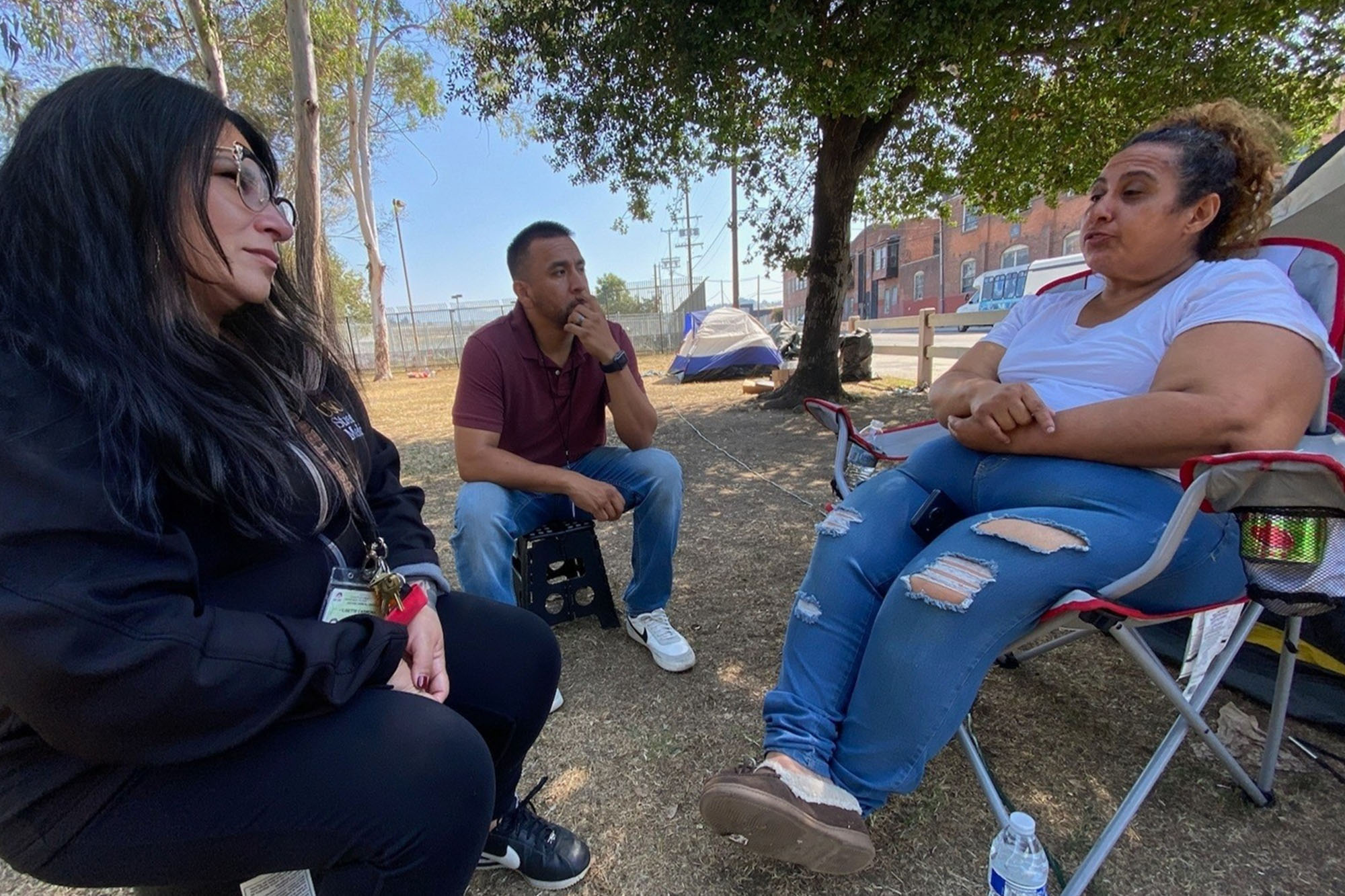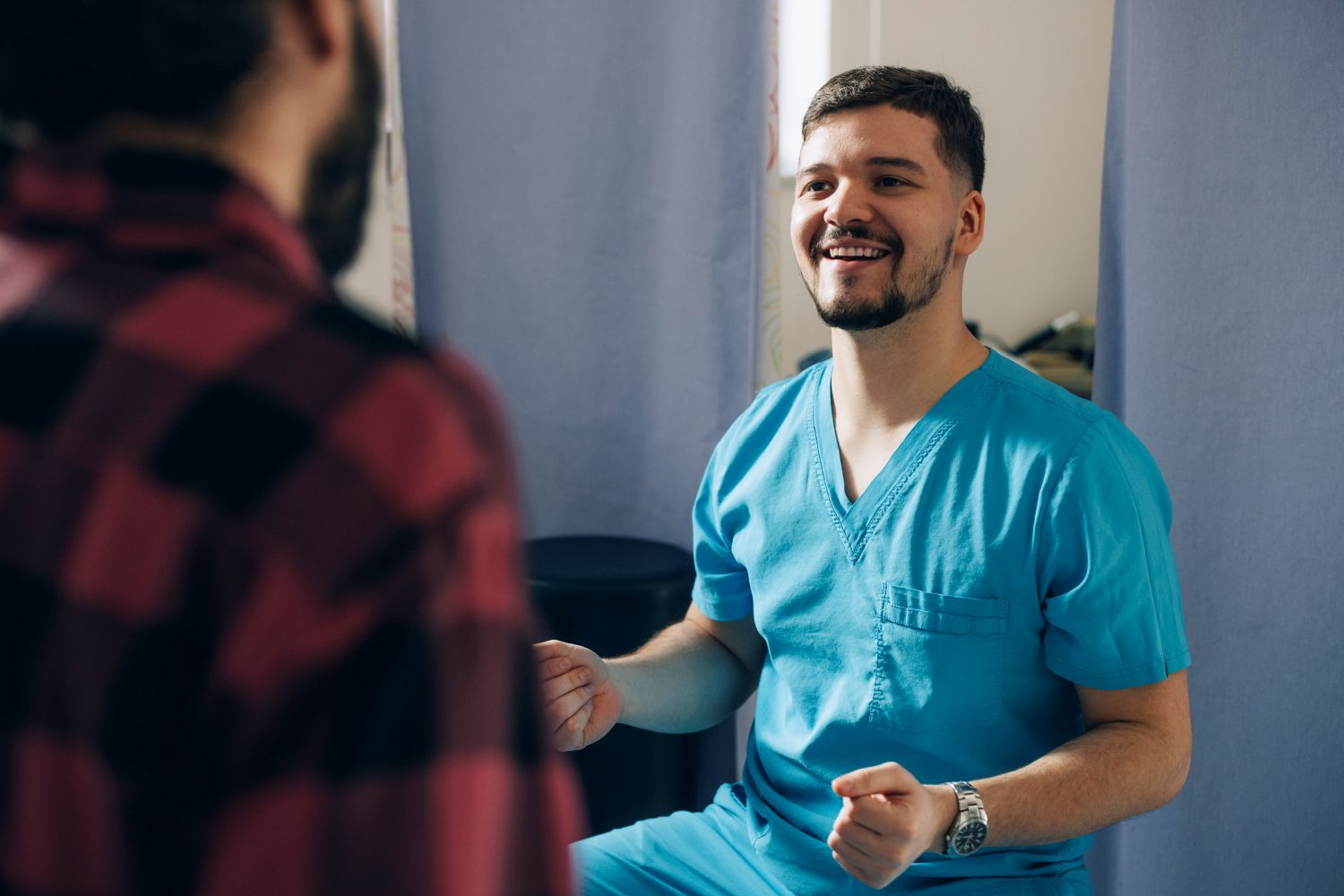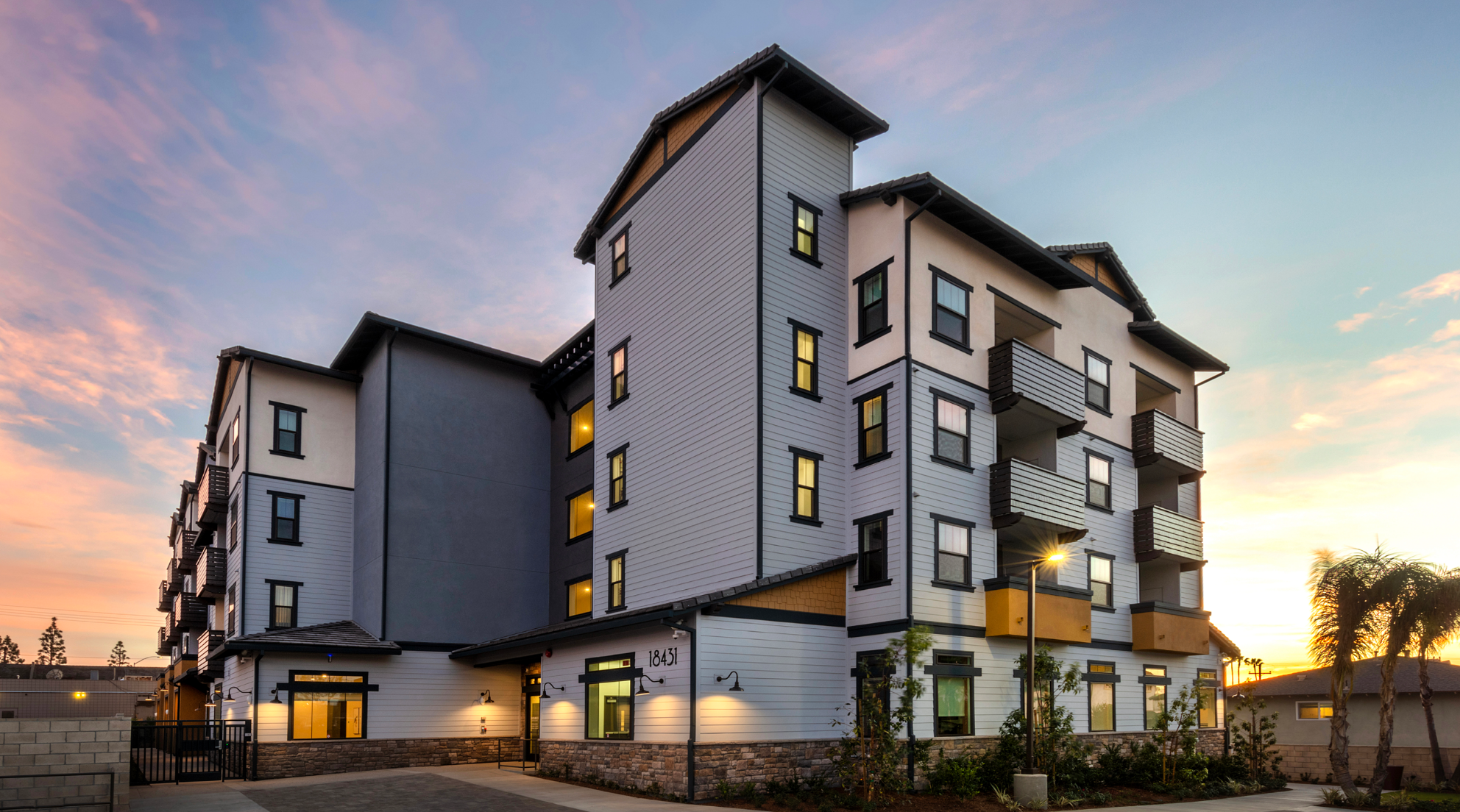View the Report
Jump to All Downloads & LinksBackground
About This Series
This series focuses on the challenges of addressing the health and health care needs, both related and unrelated to the pandemic, of people who are homeless, and spotlights emerging care innovations, partnerships, and practices across the state. See the full Homelessness and COVID-19 series.
Since March 2020, states across the country have required residents to shelter in place to stem the community spread of COVID-19. For people experiencing homelessness, public health procedures designed to contain COVID-19 — self-isolation, social distancing, and handwashing — are nearly impossible. As a result, people experiencing homelessness are at increased risk of contracting COVID-19.
Rates of chronic conditions like diabetes, chronic obstructive pulmonary disease, and substance use disorders, as well as disabilities, are significantly higher among people experiencing homelessness than in the general population, placing them at increased risk of becoming seriously ill from the virus. A recent study (PDF) found that people experiencing homelessness who are infected by SARS-CoV-2, the virus that causes COVID-19, are potentially two to four times as likely to require critical care and two to three times as likely to die compared to the general population.
Innovation
Emergency Response
At least 150,000 California residents sleep on the streets, in emergency shelters, or in homeless encampments on any given night. California was one of the first states hit by the pandemic, and the state’s policymakers, health care stakeholders, and homelessness advocates quickly realized that the state’s homeless population was deeply vulnerable to contracting COVID-19, and that a large-scale solution would be required to mitigate its risks. Within its broader efforts to flatten the curve, the state administration saw an opportunity: Partnering with the hospitality sector to provide temporary housing to vulnerable or infected people experiencing homelessness would address the immediate public health imperative, while also generating revenue for hotels and motels at a time when their occupancy rates had plummeted. Moving people into temporary housing also created an opportunity to deliver wraparound services and essential health care as needed during their stays.
Alameda County’s Experience and Resources
Alameda County launched Operation Comfort and Operation Safer Ground, two separate Project Roomkey models that provide temporary housing to people experiencing homelessness who (1) either tested positive for COVID-19, or are experiencing symptoms of COVID-19, and/or have been exposed to the virus, and (2) are over 65 or otherwise at high risk (medically fragile). To facilitate implementation across counties, Alameda County created a resource page for jurisdictions interested in the initiative. Resources include training materials, policies, and procedures; screening and referral forms; and admission intake and clinical assessment forms. They also include a personal protective equipment training video, stress care and stress reduction training, and FAQs on the Project Roomkey initiative.
Additionally, Alameda County has used a racial equity framework to prioritize individuals for placement in Project Roomkey hotels. By overlaying the existing Coordinated Entry System priority housing list with Centers for Disease Control and Prevention (CDC) criteria for COVID-19 vulnerable populations, Alameda County identified a group reflecting the homeless population overall, but with more representation among Black and Latinx residents, who are known to be hardest hit by COVID-19. Over time, Project Roomkey organizers in Alameda County have seen an increase in the percentages of Black and Latinx participants in Project Roomkey hotels, reflecting that they are prioritizing and providing space to community members at elevated risk.
In early April 2020, Governor Gavin Newsom announced the launch of Project Roomkey, the first effort in the nation to leverage Federal Emergency Management Agency (FEMA) funding to provide thousands of Californians experiencing homelessness with temporary housing. Project Roomkey is a coordinated effort by the state, local agencies, and community partners. Project Roomkey’s goal has been to secure 15,000 rooms in hotels and motels throughout the state, and to get people experiencing homelessness into a space that allows for safe and supported isolation and quarantining. To complement Project Roomkey, the governor’s office is also supporting state and local governments to purchase roughly 1,300 trailers to serve the same function as the hotels and motels. As of late June, the state had filled 10,644 hotel rooms and leased 15,837.
The public health goals of the initiative are as follows:
- To offer self-isolation for people experiencing homelessness who are asymptomatic but high-risk, including those older than 65 and those with underlying health conditions.
- To provide quarantine capacity for people experiencing homelessness who have been exposed to COVID-19 and are awaiting test results.
- To provide quarantine capacity for people experiencing homelessness who have tested positive but do not require hospitalization.
While early Project Roomkey efforts were focused on California counties with high rates of homelessness and significant rates of SARS-CoV-2 infection, by early May 2020 nearly 90% of California’s 58 counties and 300 hotels were participating in the initiative. The state legislature made $150 million for emergency homelessness aid available for shelter support and emergency housing. This funding has also been used to support local governments in identifying hotels, negotiating and executing operating agreements, and assisting local providers with documentation requirements for FEMA reimbursement. FEMA funds appropriated under the CARES Act enable state and local governments to recoup 75% of the room costs, as well as costs for essential wraparound services. Every hotel/motel within Project Roomkey is providing wraparound services, such as daily meals, custodial, laundry, security, and support staff, which can be paid for in part by FEMA funds. Behavioral and physical health care services are also being provided by local government and community partners, as needed.
On June 30, 2020, the original initiative deadline, Governor Newsom announced a program extension and an additional $1.3 billion in state funds to support programs helping the homeless population, including providing rental assistance for people facing homelessness, supporting the development of new dwelling units, and stabilizing board-and-care homes/facilities.
With a view toward the longer-term goal of more sustainably addressing California’s homeless crisis, the state is also using these funds to support local jurisdictions’ efforts to purchase and operate Project Roomkey sites to maintain them as key community assets even after the crisis subsides. The hope is that these resources will be integrated into long-term area homelessness response strategies after the initiative is over.
Implementation
Growing Pains
Counties opting to participate have taken various approaches to implementation. Local housing service providers, social services, and public health agencies are responsible for contracting with hotels/motels, identifying and prioritizing people for Project Roomkey rooms, enrolling people into the program, and making transportation arrangements for people to these settings. Project Roomkey clients must be referred to the program by a homeless services provider, health care provider, law enforcement, or other service provider. Most jurisdictions are using some combination of CDC criteria to identify those at higher risk for contracting COVID-19 (i.e., health vulnerabilities and age), as well as prioritization methods for shelter and housing, such as the Vulnerability Index – Service Prioritization Decision Assistance Tool. Some counties are running parallel programs that focus on both housing those who have tested positive or have been exposed, and separately housing medically fragile people (see sidebar). Project Roomkey in Los Angeles County targets people experiencing homelessness who are not COVID-19-positive or symptomatic but are over 65 or have serious underlying medical conditions, making them vulnerable to complications should they become infected with the coronavirus. Los Angeles County operates a separate medical sheltering program for those who have tested positive.
The initiative is not without its critics. In particular, some have argued that the pace of matching eligible people to available rooms has been too slow. Los Angeles County (PDF), which set an ambitious goal of providing temporary housing to 15,000, had placed only 3,600 people in Project Roomkey rooms by early June. Program proponents argue that the pace is slow because the work required to establish hotels as Project Roomkey sites is a huge undertaking. In some cases, the contracting process has been slowed by hoteliers’ concerns about liability and insurance. The contractual negotiations are only one step to operationalizing the initiative. To establish low-barrier and service-rich shelters, a myriad of health care and social service providers, as well as hotel support staff, have to participate, which has been difficult to achieve because of COVID-19. Residents may be experiencing health and behavioral health care needs related and unrelated to COVID-19, and some support and hotel staff, concerned for their own health and not trained to work with people experiencing homelessness, are reluctant to work in isolation hotels. In addition, initial difficulties in securing personal protective equipment increased this reluctance even more.
In some counties, the slower-than-intended placement rate also reflects hesitations on the part of some eligible individuals to participate, particularly those who require isolation and quarantine because of their exposure to COVID-19 and/or their positive status. Not all the sites allow people to bring their possessions, including pets, or offer storage for personal belongings; as a result some people are reluctant to leave their current environments. Additionally, some have been hesitant to be isolated from their social network and other community connections.
Jurisdictions that have been more successful in housing residents have been able to partner with local service providers — LA Family Housing and the Bay Area’s Abode Services, for example — to create very low-barrier and accommodating sites, as well as leverage these organizations’ outreach expertise to help people feel comfortable participating in the program. Using trauma-informed approaches to care, these local providers are able to engage with those who would otherwise not be adequately served by the shelter system. LA Family Housing managed to persuade people in a Los Angeles encampment who previously did not want to engage in services to participate in Project Roomkey. The entire encampment was allowed to stay together and keep their belongings with them. Partners recognize that serving this highly vulnerable population in a more individualized way, such as through Project Roomkey, may be a much better way to engage and support them.
While San Francisco and Alameda Counties are piloting programs that provide harm reduction programs such as services to those with alcohol use disorder in a subset of Project Roomkey locations, some eligible people with substance use disorders are reluctant to relocate due to concerns about their ability to acquire or use drugs and alcohol during their stay.
Given that there are currently no public health regulations requiring those who test positive for COVID-19 to isolate against their will, service providers are trying to creatively engage people who are not interested in transitioning from shelters and encampments into Project Roomkey rooms, to promote the safety of those individuals and their communities. San Francisco, for example, has established a mobile COVID-19 “containment unit,” a multidisciplinary outreach team that provides street medicine, meals, and other services to people who have been exposed to the virus, or are infected, to ensure they receive the necessary supports to recover.
Future Lessons
Opportunity for Continued Innovation
While Project Roomkey is serving an immediate need by housing California’s most vulnerable residents and stemming the public health threat of COVID-19 — as well as supporting hotels and motels that have seen their business evaporate overnight because of the pandemic — the initiative has the potential to become part of a long-term housing solution. Project Roomkey is a promising model to provide care to vulnerable residents in an individualized and supportive setting. The Los Angeles Homeless Services Authority and its community partners are working together to develop a comprehensive plan for those currently housed through Project Roomkey so that they do not have to return to the streets when Project Roomkey ends. Advocates acknowledge, however, that long-term solutions will require significant financial commitment from all levels of government, and that addressing the health care needs of those with complex physical and behavioral health conditions will require coordinated and intensive efforts by local jurisdictions and community partners.
The Center for Health Care Strategies (CHCS) is a nonprofit policy center dedicated to improving the health of Americans with low incomes through partnerships that promote innovations in publicly financed health care, especially for individuals with complex, high-cost health care needs. Anna Spencer, MPH, is a senior program officer and Kathy Moses, MPH, is senior fellow at CHCS. CHCS gratefully acknowledges the input and expertise of Margot Kushel, MD, director, UCSF Center for Vulnerable Populations, and Cynthia Nagendra, JD, executive director, UCSF Benioff Homelessness and Housing Initiative, and thanks them for their time in helping to inform this summary.





